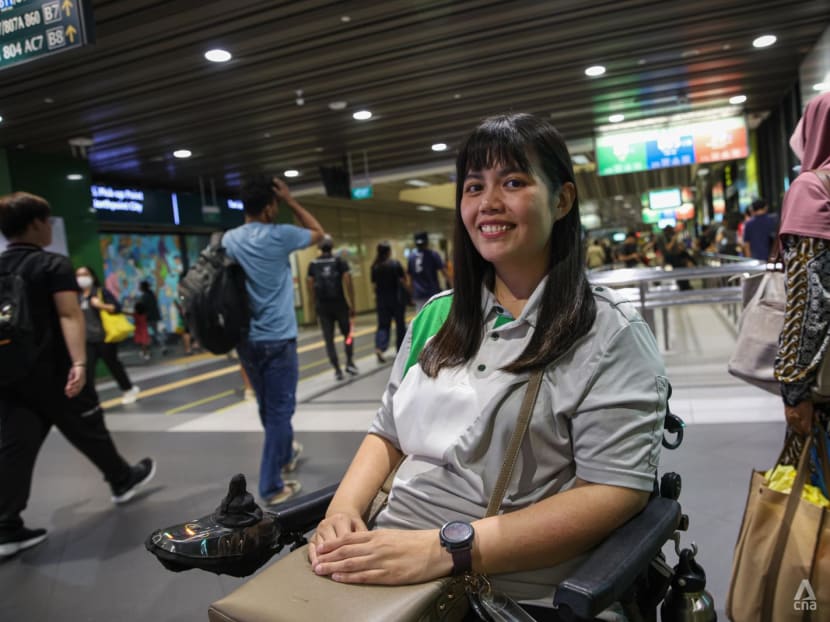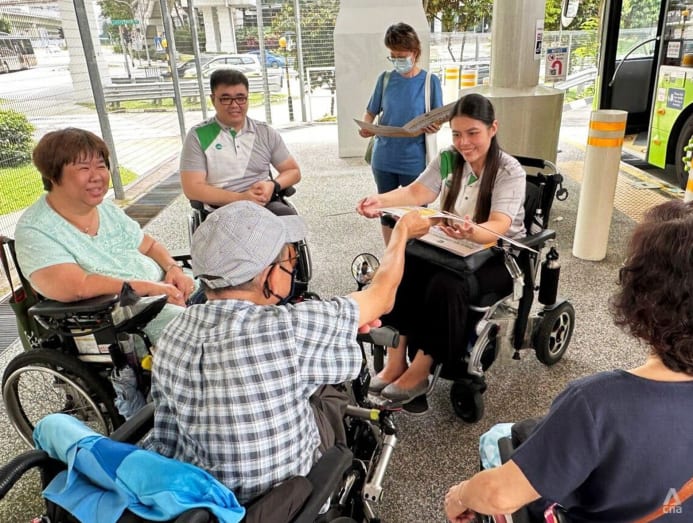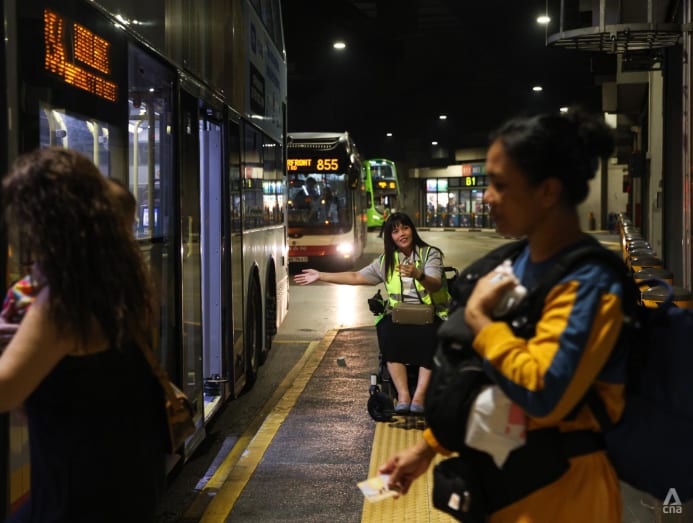'I couldn't hold myself up': How multiple sclerosis upended this 23-year-old's life, and how she's fighting back
After Ms Cheryl Tan displayed the first signs of a debilitating neurological condition at age 23, daily tasks such as taking a bus soon became daunting. Now, in her work with bus operator Tower Transit Singapore, she is trying to make public transport more inclusive for all.

Ms Cheryl Tan (pictured), who has multiple sclerosis, is a customer experience and inclusivity officer with public transport company Tower Transit. (Photo: CNA/Nuria Ling)

This audio is generated by an AI tool.
When Ms Cheryl Tan was 23 years old and first felt a tingling sensation in her right leg, she dismissed it as unimportant.
It certainly did not register as the first sign of multiple sclerosis, a neurological disease that would severely affect her ability to walk.
As a baker, she was used to the physical strain of hauling 30kg to 40kg loads of flour and sugar. Even the doctors she saw suspected a slipped disc (a condition of the spine). It seemed like an occupational hazard, perhaps, from long hours on her feet.
However, the numbness and weakness began to spread until her legs gave way completely.
Ms Tan, now 33, recounted: “One evening, I couldn’t hold myself up anymore and I was rushed to the emergency department.”
What followed was a barrage of tests, including a lumbar puncture – where a needle is inserted into the lower back to collect cerebrospinal fluid.
It was a “traumatic” procedure she shuddered to recall even some 10 years later when she spoke with me this month.
The fluid drawn from a lumbar puncture is typically analysed for whether there is an increased count of white blood cells and certain proteins, which can be indicative of multiple sclerosis.
It was only after she suffered a relapse of symptoms that doctors confirmed she was now living with a condition she had never heard of: Multiple sclerosis.
This is when the immune system attacks the protective layer surrounding nerve cells known as myelin.
“After I was diagnosed in 2015, I realised I could not work in the F&B (food-and-beverage) industry anymore because of the long hours of standing and laborious work. I had to leave.”
Hearing this, I thought about how I am now in my mid-20s and in my second job, as Ms Tan was at the time of her diagnosis. I tried to imagine what it would be like to have my life and career rewritten overnight.
Where would I even begin? Would I feel that I should I stop working? How would I afford the medical bills sure to come, without the income of a full-time job and the insurance?
For Ms Tan, losing the prospect of pursuing her passion to be a baker was just the beginning of the upending of her life.
When she was finally ready to return to work after frequent hospital visits and taking time off to recover, she found that most employers had never heard of multiple sclerosis.
Many were hesitant to take the risk of hiring her, while others were simply unable to accommodate her needs.
The condition, which is far more common in Europe and North America, is rare in Singapore, affecting just more than 300 people here, the website of public healthcare cluster SingHealth states.
Worldwide, an estimated 2.9 million people have multiple sclerosis. Several studies have found that the disease tends to affect people who live further from the equator.
That is, the closer one is to the equator, or the greater one's exposure to sunlight and vitamin D, the lower one's risk of developing multiple sclerosis.
DENIAL, DEBT AND DARKER TIMES
Multiple sclerosis is often diagnosed in young adulthood, typically between the ages of 20 and 40.
For Ms Tan and her family, they had never heard of the condition.
This lack of awareness was the calm before a tempest of questions about her own future came with her diagnosis.
How would this condition shape her medical needs, finances and career, just as her working life was taking off?
“When they gave me the diagnosis, I was so confused. I had no idea what this condition is about, what is to come,” Ms Tan said.
“Even after more than a year, I wasn’t fully accepting of my own condition, I was still in denial. How can this be? There’s no history of anyone in my family with this condition.”
Falling into a depression after her diagnosis, Ms Tan said that at her lowest point, she had every intention to end her life.
“I felt like I was such a burden to the family. I cannot provide support and I cannot support myself. That was a dark time and I almost committed suicide.”
Thankfully, she decided not to go through with the attempt after reflecting on how her parents would be “devastated”.
The process of trialling different medications for her condition, all while no longer being employed, took a heavy financial toll.
The kind of medication she needed cost around S$3,000 a month and the medication was not covered by subsidies.
Although she had some coverage from medical insurance, the out-of-pocket costs ran into five figures and Ms Tan soon found herself in debt, even receiving a lawyer’s letter from the hospital for outstanding bills.
Between 2015 and 2019, she cycled through four different kinds of medication before arriving at her current one, which manages her symptoms well.
She eventually took up job roles to do some administrative work in the healthcare sector, though these opportunities would dry up during the COVID-19 pandemic. This was because her treatment weakened her immune system, causing employers to be hesitant to hire her in a healthcare setting.

RELEARNING THE BASICS
Coming to terms with living with multiple sclerosis meant bearing medical and financial burdens and the many adjustments that Ms Tan had to make in her daily life.
In the early days of her condition, she could still walk, albeit with some numbness in her feet.
It soon became a steep learning curve as she found that her body could no longer moved the way it once did.
Feeling like a “baby” that had to relearn how to walk, Ms Tan soon became aware of how inaccessible her surroundings were.
“The corridors of public housing blocks have a slight gradient to let the water flow (away). Just that small gradient, it feels like I’m being thrown off balance,” she said, adding that these corridors can also be narrow.
By 2019, the symptoms from her condition became more prominent such that she had to “practically drag (her) leg along” while walking.
“I knew that my condition was deteriorating so much that I would need to use a wheelchair soon. I’d fall a lot and the clinic I was working in was carpeted, so I was very prone to tripping.”
When her lower limbs became too weak, she started to rely on a motorised wheelchair as her mobility aid.
At her parents' flat where she lives, the entrance has steps. She has since been using a customised and removable ramp, but cannot leave it there permanently to avoid obstructing her neighbours.
Having her parents help to keep and place the ramp every day is also impractical in the long run and she dreams of one day having her own place with a wider corridor and a doorway with no steps.
Beyond the physical challenges, Ms Tan also had to adjust to how people perceived her.
Some of them are polite in their curious probing about her condition, but there are those who make snap judgments and hurtful remarks.
On one occasion when she was using her motorised wheelchair to pick up groceries, Ms Tan encountered a neighbour in the lift who uttered “so convenient” upon seeing her.
Ms Tan took this to mean that the neighbour assumed she was faking her need to use the assistive device.
“For some people, they (assume) a wheelchair is to be used only when you are old. I responded to her, ‘I have a medical condition that you cannot see. Go and read up what is multiple sclerosis'. And I left. I was so angry,” she recalled.
Then there are the “well-meaning” individuals who offer unsolicited advice without truly understanding the chronic neurological disease.
“A majority of people are nice. They’ll come in a way that’s more polite and ask, ‘What happened to you?’ And I’ll share about my condition. But when people recommend supplements, traditional Chinese medicine, acupuncture … I’ll just smile and nod.”
Every disability is different, so Ms Tan hopes that people will be more mindful of the subtle challenges that come with living with one. And that people could be more thoughtful in their interactions with those around them.
“I feel that it’s most important for people to not be so quick to judge us and try to be more observant of what’s going on with their surroundings. Nowadays, people just look at their phone, even when walking.”
A NEW PURPOSE
Her experience of multiple sclerosis was once difficult to put into words, but to me, Ms Tan was clear and easygoing as she recounted her complex medical history.
She has a composure that no doubt serves her well in her customer-facing work role.
Now in her fourth year as a customer experience and inclusivity officer at Tower Transit Singapore, Ms Tan is adept in handling every query from lost commuters and keeping pace with the chaos of rush hour.
The public transport firm runs about 60 bus services and is the anchor operator of the Jurong East, Bukit Batok, Yishun and Sembawang bus interchanges.

Ms Tan begins her day with administrative work in her office at the Mandai Bus Depot at around 11am.
At around 4pm, she travels to Yishun Integrated Transport Hub to help commuters find their way and deal with various queries. She also wears a safety vest and a constant smile to go out to the berths to assist with crowd control.
Now a fixture at the bus interchange, it was clear that she was popular there.
Commuters have personally approached her to thank her for her assistance, with some even stopping to give cookies. She once received a box of Swiss rolls.
Telling me that she was “very reserved” and introverted before her diagnosis, Ms Tan said that her condition has forced her to open up and get accustomed to sharing her story with strangers who ask why she is in a wheelchair.
“I didn’t think that I’ll be working in a totally different industry (like transport). Furthermore, this is a very 'masculine' industry,” Ms Tan added, referring to the higher proportion of male workers in the transport line.
That it may be, but she herself is no fish out of water. I could barely catch my breath while following her as she zoomed around the Yishun Integrated Transport Hub.
She joined Tower Transit Singapore in October 2021 because it felt like a “job with a purpose”, where she could advocate for change to make public transport here more accessible.
Part of this portfolio includes strengthening the company’s two workshops aimed at just that, called the Public Bus Inclusivity Course and the Public Bus Confidence Course.
The former takes a hands-on approach for members of the public and students to discover the challenges that commuters with mobility challenges or disabilities face.
Ms Tan also leads its companion course, the Public Bus Confidence Course, which is especially close to her heart.
The course is designed to help persons with mobility challenges and disabilities gain confidence in using public transport. Participants learn route planning and take part in practical sessions to practise boarding, riding and alighting.
One highlight of her job so far was when she led such a session for patients at Yishun Community Hospital. One attendee cried because she had not been able to board a bus in years until that session.
“From a wheelchair user’s perspective, the ramp feels very narrow. There’s always that fear of falling off, which is a huge obstacle to overcome,” Ms Tan disclosed.
“On top of that, we feel like we’re making the lives of the bus captains difficult and we have to make others wait."
Looking back, Ms Tan said that having a chance to attend such a course in the early days of her diagnosis would have helped her overcome her fear of taking public transport much sooner.
“When I came over to (Tower Transit), I realised that we’re also paying passengers. We also have the right to take the bus, so it should be equal.”
Mr Glenn Lim, director of communications and customer experience at Tower Transit Singapore, said that Ms Tan's resilience, empathy and deep understanding of the challenges faced by persons with disabilities had stood out since she first joined.
"One of the key lessons we’ve learned from Cheryl is to not be pai seh (embarrassed) to ask for help," he added.
"She has taught us that many people with disabilities often feel like they are 'in the way', particularly when taking the bus, but she has also taught us that people with disabilities ought not to feel embarrassed to ask for help.
"Her own experience has shown that when asked, most Singaporeans would go to great lengths to offer their assistance."
The bus operator now employs two persons with disabilities, Ms Tan and Mr Kishon Chong, both of whom are customer experience and inclusivity officers.
The company also offers flexible work arrangements, accessible workstations, toilets and pantries. It also ensures that employees have a strong support system, Mr Lim said.
Ms Tan noted that living with multiple sclerosis has given her new strength and she is not so easily winded by new challenges or setbacks these days.
"The thoughts about regaining financial independence gave me motivation to rebuild my career.
"I would tell my younger self that being diagnosed with multiple sclerosis is not the end of the world, that there are countless other ways to work around this ‘obstacle’."
By sharing her experience, she is hoping to raise awareness on multiple sclerosis and that it may speak to others who are struggling, as she once did.
“There’s always hope. It’s like going through a tunnel. There is light at the end of it and I hope one day, they’ll say, ‘Hey, I’m in the light already’.”
WHERE TO SEEK HELP
If you, or anyone you know are feeling despondent and want to talk to someone, you may reach out to one of the helplines below.
- Samaritans of Singapore: 1767 (call), 9151 1767 (WhatsApp / text) and over email at pat [at] sos.org.sg (pat[at]sos[dot]org[dot]sg).
- Youthline (for individuals up to 35 years old): +65 6436 6612 (call), +65 8533 9460 (text) and over email at hello [at] youthline.sg (hello[at]youthline[dot]sg).
- Touchline by Touch Community Services: 1800 377 2252
- Tinkle Friend (for primary school-aged children): 1800-274-4788















